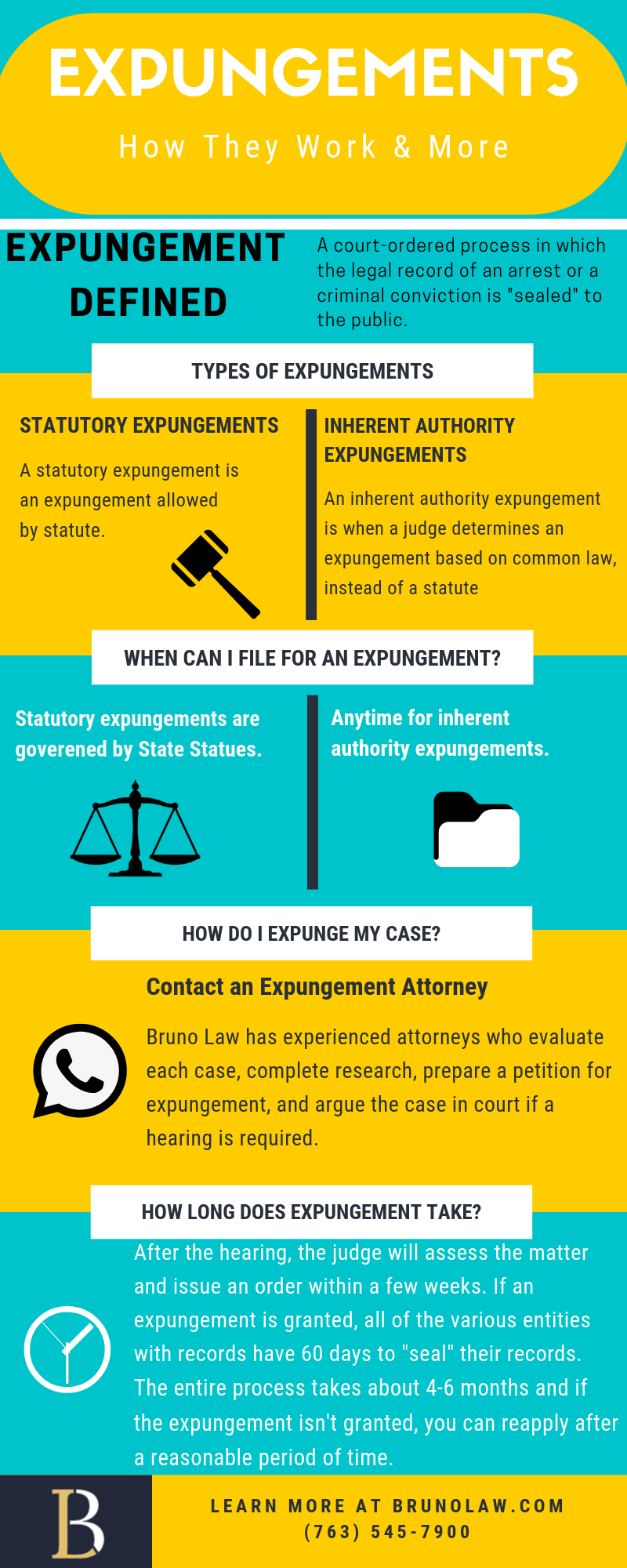
default.html.twig template not found for page: /resources/expungements/expungements-how-they-work-and-moreA criminal record can make it difficult to move on with your life, but an expungement offers a way to clear your record and start fresh. In this post, we’ll explore the types of expungements, who qualifies, how the process works, and what to expect at each step.
There are two kinds of expungement: statutory expungement and inherent authority expungement.
Statutory expungements are the gold standard. A statutory expungement is just that, one that is allowed by statute. In other words, there is a written law passed by our legislature. When the court orders an expungement that is based upon a statute he/she can order that all branches of the government seal their records, executive (police, prosecutor, BCA), Judicial (all court records), and the Department of Human Services can be ordered to seal their records. However, the order would not apply to sealing records on the driving record.
Inherent authority expungements are when a judge determines that someone is entitled to an expungement based upon its common law inherent authority, but that determination is not based upon a statute. The problem with this kind of statute is that the court can only seal the records held by the judicial branch of the government. The executive branch cannot be sealed because unless there is a statutory basis for the expungement, the judge would violate the separations of powers. Generally, we advise against this type of expungement because when someone does a background check they may still find the charge or convictions.
For inherent authority, you can file anytime. The more time that goes by without any further legal charges or convictions the better. One can apply for an expungement more than once, but the court has to be informed if one has applied for an expungement in the past.
Statutory expungements are governed by Minnesota Statute §609 A.
This statute allows one to seek an expungement under the following circumstances:
The statute specifically excludes an expungement for any crime in which one has to register as a sex offender.
The short answer is no. Just because someone qualifies to file for a statutory expungement, does not mean it will be granted. The petitioner/defendant must show that the benefit of granting the expungement would be in proportion to the disadvantages to the public and public safety.
If you are seeking an expungement under 1-4 scenarios above, it is presumed that the judge should grant the expungement unless the agency challenging the expungement can establish that the interests of the public and public safety outweigh the disadvantages to the petitioner of not sealing the record.
In the other scenarios, the burden is on the petitioner/defendant to show that the benefit of granting the expungement would be commensurate to the disadvantages to the public and public safety.
There are a dozen factors that the court looks at when deciding whether to grant the expungement. So, it is important that your petition includes information regarding all of these factors.
There is also a provision in the statute that allows for the prosecution and defense to agree and stipulate to the court granting the expungement order. This is a much quicker process, but many prosecutors will not agree to stipulate to the expungement.
I advise that you hire an attorney to file for your expungement, however, you are able to file for the expungement without a lawyer.
Once I am retained to represent a client, they will complete a questionnaire to provide me with the personal information I need to prepare the expungement petition. I will draft the petition and the client will review and sign the petition in front of a notary.
The petition then needs to be served on over a half dozen different entities and filed with the court. Everyone needs to be given at least 60 days notice of a hearing, therefore, it will be at least 60 days until there is a court hearing.
At the hearing, your attorney will argue the legal aspects of the petition and the court may ask you questions about why you want the expungement, information about your family, and work status. The petitioner should plan to attend the hearing whenever possible.
Sometimes the prosecutor will send a letter objecting to the expungement and waive his or her appearance. Other times he/she will show up and argue at the hearing. If the prosecutor does not object to granting of the expungement, he or she may send a letter to that effect or simply do nothing.
After the hearing, the judge will then take the matter under advisement and issue an order in a few weeks. If the expungement is granted, records will be sealed within 60 days. If denied, you have the option to appeal or reapply later."
This is only a summary of what one needs to know when seeking an expungement. You can see that this is a complicated process. If you need help navigating the expungement proces, Contact Bruno Law for expert guidance and a free consultation.
Related Articles:
Want Your Criminal Record Sealed?
Why You Should Get Your Criminal Record Expunged?
